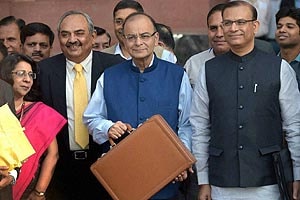Finance minister Arun Jaitley’s first full Union Budget has laid a roadmap for tax and expenditure reforms in the country to be pursued by the NDA government in the remaining years of its current tenure.
The assurance of reducing the corporate tax rate from 30% to 25%, though over the next four years, will bring India’s corporate tax system at par with the global structure with the phasing out of the exemptions that lead to litigation and distortion in the tax system.
While the comprehensive income tax exemption limit has been raised to Rs 4,44,200 in a year, it falls short of the expectation but the finance minister has promised to increase it when he has more room for it.
Union Budget 2015: Full coverage
The proposal in terms of the income tax that is expected to be discussed the most in the coming days is the one related to a black money law under which non-filing or wrong-filing of the income tax returns will lead to prosecution.
Video: Union Budget 2015: Insight by Financial Express Managing Editor Sunil Jain
This will lead to high-handed income tax assessments and action if suitable checks and balances are not put in place.
The additional 2% surcharge on the super-rich is another proposal that will be under question as it can’t be a long-term sustainable way to enhance tax collection. The abolition of wealth tax, however, is a good move.
The government will have to ultimately find ways for expanding the tax base.
Deferment of General Anti Avoidance Rules and the promise of a clarification on the taxation of indirect tax transfers will also be watched keenly.
Commitment to the implementation of Goods and Service Tax (GST) from next year will also expedite the whole process in the period left.
